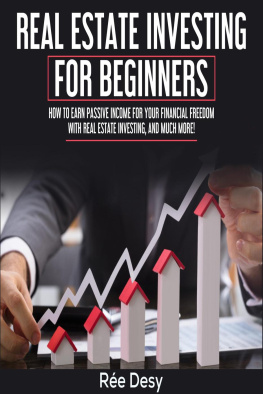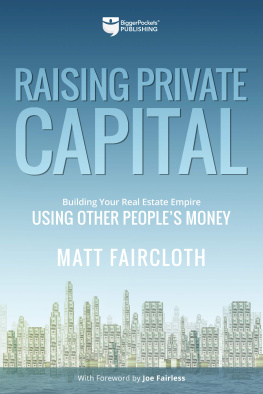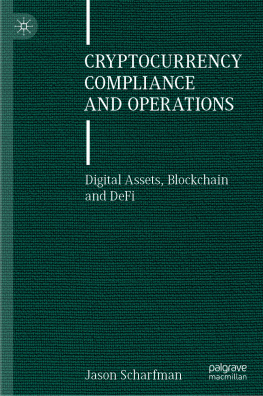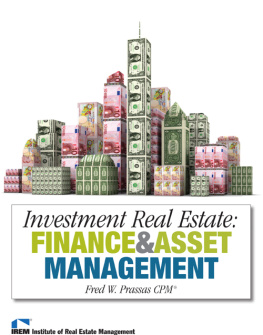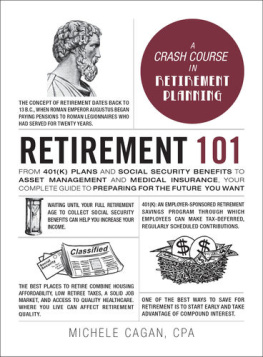Published in May 2012 by
PEI
Second Floor
Sycamore House
Sycamore Street
London EC1Y 0SG
United Kingdom Telephone: +44 (0)20 7566 5444
www.peimedia.com 2012 PEI ISBN 978-1-908783-10-3
eISBN 978-1-908783-60-8 |  |
This publication is not included in the CLA Licence so you must not copy any portion of it without the permission of the publisher.
All rights reserved. No parts of this publication may be reproduced, stored in a retrieval system or transmitted in any form or by any means including electronic, mechanical, photocopy, recording or otherwise, without written permission of the publisher.
Disclaimer: This publication contains general information only and the contributors are not, by means of this publication, rendering accounting, business, financial, investment, legal, tax, or other professional advice or services. This publication is not a substitute for such professional advice or services, nor should it be used as a basis for any decision or action that may affect your business. Before making any decision or taking any action that may affect your business, you should consult a qualified professional adviser. Neither the contributors, their firms, its affiliates, nor related entities shall be responsible for any loss sustained by any person who relies on this publication.
The views and opinions expressed in the book are solely those of the authors and need not reflect those of their employing institutions.
Although every reasonable effort has been made to ensure the accuracy of this publication, the publisher accepts no responsibility for any errors or omissions within this publication or for any expense or other loss alleged to have arisen in any way in connection with a readers use of this publication.
PEI editor: Wanching Leong
Production editor: Julie Foster
Printed in the UK by: Hobbs the Printers (www.hobbs.uk.com)
Contents
By Doug Cornelius, Beacon Capital Partners, LLC
By Erik A. Bergman and Justin J. Shigemi, Finn Dixon & Herling LLP
By Charles Parsons and Stephen M. Meli, Proskauer Rose LLP
By Tamasin Little, SJ Berwin LLP
By Karl Ehrsam, Brian Ruben and Craig Friedman, Deloitte & Touche LLP
By Edwin C. Laurenson, McDermott Will & Emery LLP
By Joel M. Cohen and Anya R. Grossmann, Gibson, Dunn & Crutcher LLP
By Cary J. Meer and Deborah A. Linn, K&L Gates LLP
By Laura S. Friedrich and Zachary W. Bodmer, Shearman & Sterling LLP
By Anthony Conte and David Harpest, PricewaterhouseCoopers LLP
By Scott D. Pomfret, Highfields Capital Management and Matthew T. Nullet, PricewaterhouseCoopers LLP
By Nicholas Tsafos, EisnerAmper LLP
By John N. Marshall, Constantine Korologos and Lev Yagudayev, Deloitte Financial Advisory Services LLP
By Joel A. Wattenbarger, Ropes & Gray LLP
By Daniel New and Danielle Ryea, Ernst & Young LLP
Introduction
The Dodd-Frank Wall Street Reform and Consumer Protection Act in the US mandated many changes affecting financial service firms, including a requirement for hedge fund and private equity fund investment to register with the Securities and Exchange Commission (SEC). The effective date for the new registrants was March 30, 2012. Advisers to private equity funds making investments in real estate have been confronted with making what can be a complex factual and legal determination of whether they are required to register with the SEC. This publication, The US Private Real Estate Fund Compliance Guide, will provide a framework for the review of whether a real estate adviser is required to be SEC registered and regulated and then, if so, provide the necessary guidance for preparing and filing the Form ADV registration form with SEC and establishing the necessary compliance program.
The first chapter, SEC registration for private real estate advisers , works through an analysis of whether an investment adviser is required to register. The analysis starts with the Investment Advisers Act of 1940 (the Advisers Act) definition of an adviser as:
[A]ny person who, for compensation, engages in the business of advising others, either directly or through publications or writings, as to the value of securities or as to the advisability of investing in, purchasing, or selling securities, or who, for compensation and as part of a regular business, issues or promulgates analyses or reports concerning securities
The important issue for the real estate advisers is what is a security. This process involves complex legal determinations. And then the question is at what level of holdings in securities does an adviser reach the requirement to register. According to the Form ADV Part 1 registration form definition, a:
Real estate fund means any private fund that is not a hedge fund, that does not provide investors with redemption rights in the ordinary course, and that invests primarily in real estate and real estate related assets.
An initial examination point once the adviser determines to register is to establish written policies and procedures in a compliance manual (see chapter titled Setting up a compliance program ). The SEC recognizes that an advisers compliance program should be designed for the particular adviser, taking into consideration such factors as the size of the firm in assets under management, number of employees and offices, and the nature of the business and investments. The development of the compliance program should begin with a review of risk and an analysis of conflicts of interest. The information in the chapters Identifying and managing conflicts of interest in private real estate funds and Compliance for multi-strategy private real estate firms will help the adviser analyze those issues that should be considered as an important step in designing its compliance policies and procedures. For example, there is an inherent and possible conflict of interest a real estate adviser may face if a property owner has financial difficulties, or if the adviser holds a security in several funds with differing seniority rights.
Multi-strategy funds, which have become popular as advisers diversify their investment strategies to take advantage of opportunities resulting from the recent financial crisis, may be involved in potentially conflicting investment instruments including:
(i) Private real estate equity, including direct and indirect interests in real property.
(ii) Private real estate debt, including mortgage loans and mezzanine debt.
(iii) Public real estate equity, including securities related to real estate such as real estate investment trust (REIT) securities.
(iv) Public real estate debt instruments such as commercial mortgage-backed securities (CMBS) and collateralized mortgage obligations (CMOs).
Once an adviser is registered, it is subject to the same legal and regulatory requirements of any SEC registered adviser. The chapters Form ADV Parts 1 and 2, Marketing, advertising and fund solicitations for private real estate fund advisers









